
| ||
 | ||

See story "Documenting good teaching" All photos by Owen Egan except Derek Hart, courtesy ICC. |
American historian and novelist Henry Brooks Adams, who taught at Harvard in the 1870s, wrote that "A teacher affects eternity; he can never tell where his influence stops." Apart from the business of gender, this holds true today, as confirmed in an informal study by an English professor at Rollins College in Florida. Professor Barbara Harrell Carson wrote to Rollins alumni, requesting anecdotes about particularly memorable professors. The results, excerpts of which appeared in last month's University Affairs, astonished her. She was amazed at how vivid and specific people were in their recollections of teachers, in some cases 30 years after graduation. And even the briefest of encounters can be pivotal. One graduate wrote, "Although I have great respect for several professors in my major, it was actually a professor who taught the senior seminar one day who had the most profound effect on me." We proudly present the recipients of McGill's teaching awards announced at the University's June convocations. We had hoped to introduce them a little earlier in the fall, but they were so busy teaching, supervising and mentoring, it took a while to track them all down and persuade them to sit still long enough to be photographed and to write a few paragraphs for us. As our winners already know, professors who love their subjects, who respect and care about their students, and who can make connections between the two, are the most effective teachers. If they don't love what they're teaching, it shows. One Rollins graduate wrote "It's like…sitting in a room listening to someone say, 'I hate my job.'" As Adams said, a teacher's influence lives on. According to Carson, "Student after student said the same thing: Decades after leaving college, they wrote of the continued presence of their professors in their minds No doubt these McGill teachers will linger long in the memories of their students. Diana Grier Ayton |
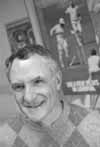 |
Leo Yaffe Award for Excellence in Teaching Teachers who inspire frequently set the career paths that we take. At high school in "apartheid" South Africa where I grew up, I was fortunate to have a mathematics teacher who was considered to be the finest in the province. I wonder if he had an impact on Anthony Williams-Jones of the Department of Earth and Planetary Sciences at McGill, who also won the Leo Yaffe Award and who went to the same high school as I. After my master's degree in mathematical statistics at the University of Natal in South Africa I obtained my PhD in statistics at Purdue University in Indiana before coming to McGill in 1974. An analysis teacher at Purdue, Chris Neugebauer, was quite remarkable. He would come to class empty handed and, with precision and passion, would lay out the proofs of the most complicated theorems. Chris, with whom I also played squash, later told me that his "show" was well rehearsed and that it required careful preparation. This is, I think, the key to effective teaching. I believe, too, that there has been a recent overemphasis on teaching aids that risk replacing the burning zeal of a no-frills approach to instruction. We really only learn by self discovery, by convincing ourselves. The main role of a teacher is to guide and to create a desire to learn. |
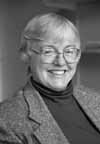 |
H. Noel Fieldhouse Award for Distinguished Teaching The past is gone forever, and yet it is always with us. For me, this paradox is the Big Question; working on it gives meaning to my life. What I love best about teaching is the opportunity to work on this Big Question in the company of other minds Every student also has a Big Question, though most are still in the process of finding it. For many, that question will not be about the past, but that does not matter. Training in the discipline of history exercises intellectual and moral muscles which can be put to work on almost any Big Question, and a lot of lesser ones as well. For example, because history is an alloy of evidence and argumentation, it is a marvellous education for citizenship in a democracy; to put it very bluntly, it teaches you to smell BS! My goal as a teacher is to help my students attain mastery in this special kind of thinking. I have no "technique" for teaching, let alone a philosophy of teaching. I do what works, which means what helps the students to think deeply and rigorously about experiences which are both inaccessible and significant I find out what works by trial, a lot of error, and above all, from my colleagues, many of whom are vastly more creative teachers than I am. I shamelessly pillage their ideas and techniques, and if I enjoy some success as a teacher, it is in no small measure due to their skills and generosity. |
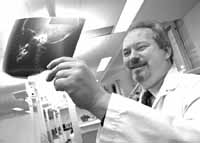 |
W.W. Wood Award for Excellence in Dental Education This award is a crowning career achievement and highly cherished, since it originates from an anonymous nomination and vote by the graduating class. Recognition for teaching is most gratifying since it is the essence of a commitment to impart knowledge and to demonstrate clinical skills to future dentists. As our dean once told a rebellious class 24 years ago, we are not all born teachers, nor have we been instructed in the art of teaching, we do the best we can. Our role models are those who came before us, those teachers who left a lasting imprint by their style, patience and enthusiasm for the art and science of dentistry. It is this passing of the torch that sustains generations of teaching excellence at McGill's Faculty of Dentistry. It was important for me to give back and to come back to the faculty upon graduation from special studies. It was easy to be critical as a student, but the challenge was to return and change the system from within. During my last lecture to the graduating class I ask students to remember their alma mater and to come back to teach, to change what they didn't like as students and to help advance dental education. Many do return and it is with pride that I observe another generation, perhaps once also rebellious, taking on the responsibilities of education. I thank the Class of '97 for this honour, my mentors who inspired and taught by example and my fellow division staff who have always shown dedication and commitment to the faculty. |
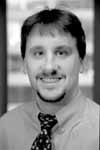 |
Distinguished Teaching Award (Undergraduate Level) Ten years ago when I came to McGill University as an undergraduate student, teaching as a career had never crossed my mind. Having completed a BComm in Economics and Management Information Systems, I went on to do an MBA in Marketing and Management Science, also at McGill. During my undergraduate studies, I began giving statistics tutorials as a part-time job. I taught my first course during the summer of 1990, and I never dreamed that I would love the classroom so much. When I had completed my MBA, I left Montreal for Los Angeles to pursue my dream of becoming a rock star. It wasn't long before I realized that my real audience was back at McGill. Having once sat in the very classrooms I now teach in, I simply try to provide the explanation that I would have required and expected as a student. I learn through the interaction with students, constantly adapting depending on how well they receive my explanations and on the questions they ask. Currently, I am integrating technology into the classroom as much as possible as I feel that is the type of training students need to be successful in their eventual careers. |
 |
Distinguished Teaching Award (Graduate Level) Many years ago my mentor, a history teacher at Northmount High School, told me not to go into teaching with the expectation of receiving praise from my peers and thanks from my students. So this award was completely unexpected but greatly appreciated. My belief is that students respond to teachers who are excited about what they are teaching. I try to temper my enthusiasm with humour and make the students feel comfortable in the classroom. I also use anecdotal information about well-known statisticians, my business experience and my family in order to humanize the process of learning statistics. I hope that there is something amongst the topics I talk about that catches the interest of the individual student. If students can identify with you, they become receptive to the course material. Teaching is primarily an art, but the classroom environment is very important. Since I started teaching at McGill in 1986, there have been major changes to the educational delivery system. Although I love to use blackboard and chalk, we have evolved to the use of transparencies and more recently, to the use of the classroom podium/computer-oriented approach to presentation. The dean has shown his commitment to excellence in teaching by providing faculty with the latest educational delivery-systems technology. My goal is to incorporate the computer-based approach into my course by next September. |
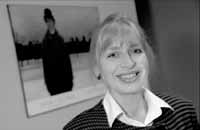 |
Centre for Continuing Education Distinguished Teaching Award Lorsque à l'âge de 6 ans, dans la Pologne communiste où parler français n'était pas du tout à la mode, j'ai commencé à apprendre cette langue, j'étais loin d'imaginer que mon avenir professionnel se dessinait déjà. Un grand amour pour le français était sur le point de naître, amour un peu houleux au début Oui, parce que l'enseignement n'est pas qu'une profession, c'est une vocation. Pouvoir transmettre à mes étudiants ce que j'aime tellement me paraît très gratifiant; leur faire connaître non seulement les règles de grammaire, mais aussi un peu de littérature et de culture francophones est un privilège. En même temps, cet enseignement n'est pas à sens unique. Mes contacts avec les étudiants venant du monde entier et qui cultivent des traditions souvent éloignées des miennes sont pour moi très enrichissants et m'aident à élargir mes horizons, à devenir plus tolérante. Je suis très flattée par la reconnaissance que m'ont témoignée mes étudiants du cours intensif de français en proposant ma candidature pour le prix d'excellence en enseignement et fière de faire partie, depuis plus de dix ans, d'une formidable équipe d'enseignants du français langue seconde au Centre d'éducation permanente de McGill. |
 |
Osler Award for Outstanding Teaching In joining the Faculty of Medicine at McGill in 1970 as a newly minted urologic oncologist, I could not have imagined that my career path would shortly be diverted from the safe familiarity of surgery and the research lab to the then-unfamiliar territory of caring for the terminally ill. A 1973 study at the Royal Victoria Hospital suggested unacceptable deficiencies in the care of the dying and their families. A visit to the recently opened St. Christopher's Hospice in London, England, illuminated a world of unexpected potential for relief of suffering, newfound meaning, reconciliation and healing. The traditional biomedical model mandate of fighting disease had been replaced by a broader vision that was centred on experienced illness, rather than the pathophysiology of disease. In anticipating the reported excellence to be found at St. Christopher's, I recall thinking that I would have to see it to believe it, and realized that this would probably be true for my colleagues as well. As a result, I borrowed a Nikon camera from a friend for the first visit. The resultant slides spoke for themselves and convinced the Royal Vic that there was a better way to fly and taught me the importance of letting the patients and their family members do the teaching. The path that has followed has been an ongoing multimedia adventure in which I have been privileged to share with colleagues the experiences of those who find themselves confronted by reality in the arena of terminal illness. |
 |
Osler Award for Outstanding Teaching I have been a teacher of the nervous system, particularly its anatomy, to first-year medical students since 1973. I was inspired to teach by the example of outstanding teachers at Bishop's College School, Bishop's University, in the Anatomy Department (now Anatomy and Cell Biology) at McGill and by Simeon Locke, a neurologist (in Boston) and Hans Kuypers, a neuroanatomist (in Cleveland and Rotterdam). When I took over the nervous system course in 1973 the class increased in size from 130 to 160 students and remained at this size until recently when it again returned, after the addition of first-year dental students, to about 130. Thus for almost a generation I have been in close contact with a large number of students at the beginning of their medical and, more recently, dental careers. The nervous system course is demanding in terms of both subject matter and time, so that it is a challenge for student and teacher. My greatest reward is the pleasure I feel when from time to time former students stop to tell me that they remember the course; even more so when they tell me, although less frequently, alas, how much they learned from it. In return I learned, by virtue of their questions, more than I ever thought I could absorb and remember about that fascinating subject, the nervous system, as well as the great value of a sense of humour. I am grateful to have been recognized for something that has given me so much satisfaction. |
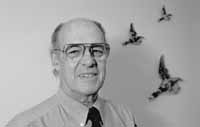 |
David Thomson Award for Graduate Supervision and Teaching The key to being a good teacher at the graduate level is having good students, and at McGill we have a lot of truly outstanding ones. Through good luck and hunches about people, I've been blessed during 34 years of teaching to have had my share of excellent graduate students. Some have become world authorities on various topics in psychology, heads of departments, and so on. They are all a source of joy and pride to me. My door is always open to students who come to me to discuss ideas or possible experiments. My task, as I learned from Donald Hebb (whose views still pervade this department) when I was his graduate student, is to help them evaluate problems and make good decisions. The best students thrive in an atmosphere of freedom to pursue their own problems and ideas. How do I know when I've got a special student? It's his or her initiative, enthusiasm, drive to succeed in the research they've chosen and in their career in general. My role with such students is to guide, not to push; provide help that's asked for, and suggest ideas that may be relevant to their interests. Winning this award is a real thrill. I was a graduate student when David Thomson was Dean of Graduate Studies. He chaired almost every PhD thesis oral, including mine, and even helped me out when I failed to understand a question. His brilliance was always tempered by good humour and gentleness. He is one of McGill's legendary people and I'm honoured to receive the award created in his name. |
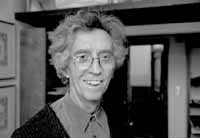 |
Engineering Alumni Award for Outstanding Teaching I am very pleased at having received the Engineering Alumni Award for Outstanding Teaching. For me, McGill has been and still is a happy place to teach, where there is enough freedom to develop ideas. After graduating as an art student at the Montreal Museum of Fine Arts, I began my teaching career there, assisting renowned artist and art educator Dr. Arthur Lismer. He headed the Children's Art Centre and the Adult Art School at the museum. I think he was the most important influence in my art teaching career. I was fortunate to have had the opportunity to be in a place and time where there were excellent educators in the fine arts. The time had a particular "creative mood." The other very important influence is the great number of fine students who attended and are still attending my courses at the School of Architecture and the Faculty of Education at McGill. I have been an art teacher here for over 35 years and if one were to ask me where I learned to teach, the answer would be mostly from the students. Over the years, I have encountered many challenges in teaching drawing and painting. It is the students' needs and these challenges that have helped me form a curriculum and a philosophy in teaching art to students. It seems a good time to thank all the students I've taught; the wonderful people who stimulate my interest, who make me invent ways to teach and who make me teach more and more intuitively. |
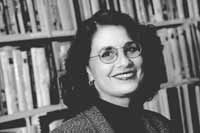 |
Faculty of Education Award for Distinguished Teaching I work with Education students, teaching them about students who have special needs, children and youth with difficulties and disabilities. I am constantly inspired by how much the Education students want to make a difference in children's lives! I encourage them to hold on to their ideals. We work on learning to listen to children; to respond to their strengths and needs; and to create classrooms that are welcoming, alive, interesting, and meaningful. I want my students to reach their goal of making a difference for the students in their classrooms. Of course, I am delighted about receiving this award, but I must say I have had plenty of time to practise! I have been teaching at McGill for more than 20 years. Yet teaching is always new Mainly, though, I enjoy the students. They are open, eager to learn, willing to get involved, to care about kids, to make a better future. That's the heart of education. |
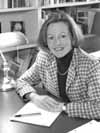 |
John W. Durnford Teaching Excellence Award Receiving this award has meant a lot to me for a number of reasons. First of all, it is named for someone who was one of my teachers at McGill and who has become a wonderful mentor for me since I joined the faculty as a professor. His heartfelt respect for his students and the seriousness with which he took teaching has always impressed me deeply. Having Professor Durnford present me for the award at convocation made it particularly special for me. It was also a great honour in light of the fact that I am surrounded in this faculty by many committed teachers, a number of whom were also nominated and who were at least as deserving! For me, the best part about teaching is having the opportunity to see students develop over the time they are here. I have seen many students find their niches and almost literally blossom. I have also (particularly in my earlier incarnation as Associate Dean) seen many students succeed in the face of extraordinary hardship or challenge. What this implies is that teaching, and the joys of it for me, are not restricted to the classroom but extend to the myriad of other activities that comprise student and faculty life. |
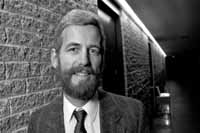 |
Macdonald College Award for Teaching Excellence My understanding of the role of a university professor as a teacher has evolved considerably over the last 10 years, from a concept of the professor as the source of information and knowledge, to a concept of the professor as a facilitator of learning. Information and knowledge have expanded in every discipline, to the extent that it has become impossible to teach students everything they need to know. At the same time, technology has vastly increased the accessibility of information beyond the doors of the university. My role in the classroom is to provide the conceptual context in which learning can occur and to encourage the development of thinking skills that allow students to take control of their own learning process. My courses have become more exploratory, examining linkages between concepts and disciplines, and are aimed at getting students in touch with what they already know, and helping them to build on that knowledge. One of the challenges is the need to eject students from their comfortable recipient positions in the lecture room in order to encourage, cajole, browbeat or coerce them into taking responsibility for their own learning. There are risks. Once students take control of their own learning there is no telling where a lecture or discussion will end up, and we often explore a subject far more deeply than I would have if I were simply presenting the information. My biggest personal challenge has been to get comfortable with the necessity to admit that I don't know the answer. |
 |
Class of '44 Award for Outstanding Teaching Teaching at McGill has been my hobby for the last 23 years. Each year it is a new experience to receive the first-year Chemical Engineering students and see them transforming during the semester from nervous beginners to self-assured university students. My secret for teaching is to learn from students. Each class is different and has to be treated specially. In the first-year course (with an enrolment of about 100), I form study groups of three or four students each. We reserve rooms for the groups to meet, and students of upper classes help as volunteer-consultants in solving typical problems. One key element is that the students know in advance which problems they are supposed to master between the tests. In this way, they can plan ahead and feel in control of their time. Although students are under a certain stress during the course, once in higher classes they realize that they have learned not only the subject matter but also how to study, to think critically and to solve problems. |
|
| |||||